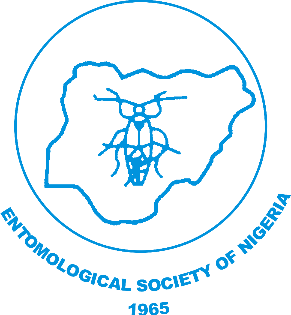Effect of Mating Disruption in Leather Beetle, Dermestes maculatus on Biological Activities and Nutritional Quality of Infested Smoked Catfish, Clarias gariepinus
NJE Vol. 36: 129-138, 2020
DOI.10.36108/NJE/0202/63.01.51
Nduka, U. G., Zakka, U., Nwosu, L. C.* and Azeez, O. M.
Department of Crop and Soil Science, Faculty of Agriculture, University of Port Harcourt P.M.B. 5323, Port Harcourt, Rivers State, Nigeria
Abstract
Mating between male and female leather beetle, Dermestes maculatus infesting smoked catfish, Clarias gariepinus was disrupted in this study. The effects of disruption on pest biological activities and nutritional quality of fish after pest infestation were determined using standard methods. Mating disruption technique of 2:1 (♂: ♀); where the males were removed after 24 h of mating had the highest
number of survived adults. Number of developed larvae (156.80 and 167.50) was significantly higher on treatments 1:2 and 2:1 (♂: ♀) in which males were removed after 48 h and 24 h, respectively. Frass weight generated by the beetle was higher in the mating disruption treatment 2:1 (♂: ♀) in which the male insects were removed at 24 h. Mating disruption technique 1:1 (♂ : ♀) in which male was removed after 144 h of mating, had higher ash content (5.307%) whereas, the least ash content (3.622%) was recorded in mating disruption treatment 1:1 (♂ : ♀) and the male was removed after 120 h. Moisture content (29.05%) was significantly higher on mating disruption technique 1:1 (♂: ♀) where the male was removed after 144 h. Mating disruption resulted into different number of offspring of D. maculatus and different degree of loss of minerals. These give unequivocal signal that mating disruption can affect biological activities and nutrient quality. Therefore, the use of physical mating disruption technique can be applied to D. maculatus control to reduce their (adults and larvae) biological impact on smoked fish and ensure quality and sufficient fish for human use.
Keywords: Mating disruption, nutritional quality, Dermestes maculatus, biological impact, smoked
fish.
